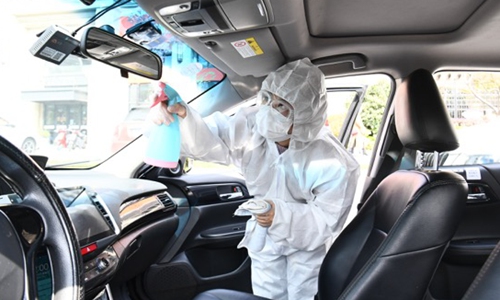HOME >> SOURCE
Cab, DiDi drivers in Beijing fear for their jobs
By Zhang Dan Source:Global Times Published: 2020/3/29 18:33:40

An employee at DiDi Chuxing sprays disinfectant in a DiDi driver's car on March 13 in Hangzhou, East China's Zhejiang Province. Photo: cnsphoto
Beijing taxi driver Sun Lan is not sure whether the coronavirus outbreak will bring an early end to his career. The 58-year-old Beijing resident wants to earn more money to pay his new house loans before retiring at 60.
Even though traffic jams have returned to the city since March, and as many people applauded the congestion as a sign of recovered economic activity, Sun has to park his car during most time of the day. Few people call a taxi, no matter online or offline.
"I can only carry passengers before 10 am and after 5 pm when workers go to and leave the office… If people outside Beijing do not come back to the city, I will not have any deal," Sun told the Global Times.
As coronavirus cases from abroad kept growing day by day, Beijing - the capital city - has not relaxed its vigilance yet and is taking strict measures to prevent and control the virus spread to avoid "a second wave" of the outbreak.
Anyone who returned from other cities to Beijing must quarantine himself or herself for 14 days, a local community supervisor in Beijing confirmed with the Global Times on Friday.
At loose ends
After January 28 when cities in China took restrictive measures to control mobility, Sun did not work until March 9.
Even though his company exempted the monthly taxi lease expense which is 3,300 yuan ($465), his income in March was only one-third of the amount before the virus outbreak.
"I could only earn about 200 to 300 yuan per day and had to pay about 80 yuan for gasoline," Sun said. Before the coronavirus hit China, he earned 800 to 900 yuan each day.
The Beijing Capital International Airport used to be a gathering place for taxi drivers, where they could wait for passengers for a maximum of two hours. Sometimes, Sun only needed to wait for 15 minutes for passengers.
But now, few taxis go there. "I heard a taxi driver waited for seven hours at the airport for one passenger recently," Sun said, adding that he will not go there. "You won't have too many passengers as those flying from abroad will directly go on designated buses for quarantine."
Known for their typical Beijing-style humor, some of the taxi drivers in Beijing are talkative.
Without having passengers to talk with, Sun stays in the taxi and does nothing for most of his working days.
Some of Sun's friends at his age plan to return their taxi to the company and give up their jobs.
Sun is not sure whether he could earn more in April and whether his company will continue to exempt the lease expense if the situation lasts longer.
Ride-hailing
For drivers at Chinese ride hailing giant DiDi Chuxing, their businesses are not much better than taxi drivers in Beijing.
Sun Haishan cleans every corner in his car before setting out every morning. Whenever a passenger gets out of his car, he sprays disinfectant on the seat and doorknobs.
Even after insisting working during the Spring Festival holidays, his family has been feeling increasing financial burden since the virus outbreak.
"The coronavirus has impacted my family life hugely. I have two kids and now my wife and I decided to cut down on unnecessary expenditures," he told the Global Times.
Earning two-thirds of his previous income, the father said that there is no other way besides working hard because he is the main source of income in the family.
Now he mainly waits in areas of the CBD in Chaoyang district, Beijing, where the heat map on the DiDi platform shows large population in real time.
"Continuous coughing by passenger would make me very nervous," he said, adding that during the Spring Festival holidays, he slept in a room alone instead of staying with his children and wife.
"I found most of the passengers did a better job of self-protection than us. Many of them wear face masks, rubber gloves and goggles," he said.
To protect the drivers, DiDi installed protective sheets between front and rear seats in the vehicles.
In addition, it facilitated insurance coverage for drivers across China and coordinated with leasing partners to promote an extension of current leases.
The company told the Global Times that ride-hailing demands have rebounded significantly over the past three weeks as cities and businesses have resumed business operations.
In a bid to help the company's drivers who have been financially suffering, DiDi launched delivery services in 21 Chinese cities, including Shanghai, Shenzhen and Chengdu.
"These services give these drivers an additional source of income," the company told the Global Times in an announcement. But Beijing is not on the list.
Didi is one of China's biggest tech companies and backed by Japan's SoftBank. In 2019, more than 11.66 million drivers earned money on the platform.
A DiDi driver in Beijing who remained anonymous predicted that his income would return to its previous level by the end of May or in early June.
"There are not many customers if workers from other cities do not come back to Beijing… When I earned 300 yuan in the past, I would have noodles for lunch. Now, I just have bread and instant sausages to fill my belly," he said.
Newspaper headline: Less orders
RELATED ARTICLES:
Posted in: INDUSTRIES,BIZ FOCUS